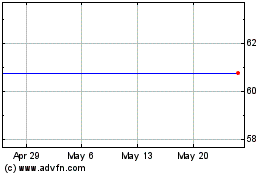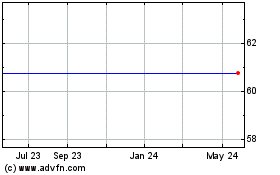By Alexandra Bruell
Comscore Inc.'s new deal with TV station owner Nexstar Media
Group Inc. is the latest sign the ad industry is warming to
alternative TV currencies.
For decades, Nielsen Holdings' TV viewing data has underpinned
the vast bulk of transactions between media companies and
advertisers. But recent events, including ComScore's inroads in
local TV and Nielsen's ongoing contract dispute with CBS Corp.,
point to intensifying competition.
To be sure, ad buyers want more options, not a switch from one
dominant player to another, and Nielsen won't be dislodged from the
top spot any time soon, according to industry executives.
But as traditional audiences scatter, pressure for better
metrics is giving media companies -- as well as Comscore, Nielsen's
main rival -- new traction against TV's kingmaker.
The deal with Nexstar, announced Thursday, makes Comscore the
sole TV ratings provider for Nexstar stations in 97 out of 100
markets, including Nashville, Indianapolis and Hartford, up from 51
exclusive markets before.
Comscore also recently struck deals for expanded relationships
with Gray Television and E.W. Scripps Co.
"Since we just launched this new arrangement, we're starting to
bring those [Comscore] currencies to buyers," said Frank Friedman,
VP of local media consumer engagement at Scripps and a former media
agency executive at Publicis Groupe. "We're seeing the evolution of
buyer and seller and taking a hard look at how we transact and the
currency that undergirds what we do."
Comscore has increased its contracts with station groups in the
U.S. by 20% year-over-year going into 2019, according to the
company, including an increase in exclusive contracts.
CBS standoff
Meanwhile, as Comscore gains ground at the local level, Nielsen
is sparring with CBS over the terms of a deal to replace a contract
that ended on Dec. 31.
CBS, which had been paying Nielsen for a bundle of products,
including local and national ratings, doesn't want to pay Nielsen's
proposed rates for its local ratings product, among others,
according to people familiar with the matter.
Media buyers are broadly hoping for a rapprochement, as access
to Nielsen's CBS data for both the media buyer and seller makes it
easier for them to choose and purchase TV ads. But the drama has
some buyers wondering whether Comscore's currency, which they are
increasingly using at the local level, could also serve as an
alternative at the national level.
"The greater utilization and comfort with Comscore ratings data
increases the possibility of broader use in the national TV
marketplace, " said Ed Gaffney, managing partner and director of
implementation research at WPP PLC ad-buying giant GroupM.
Mr. Gaffney said GroupM increasingly has been using Comscore
data, while many local stations are also turning to Comscore
ratings in negotiations with ad buyers. WPP has a stake in
Comscore.
Nielsen remains the currency of choice in transactions between
ad buyers and national TV networks, and many station groups with
Comscore contracts still use Nielsen in large markets.
"The industry relies on Nielsen's accredited measurement to
underpin more than $130 billion in advertising that is transacted
each year," said a Nielsen spokesman in a statement. The spokesman
emphasized that Nielsen measures viewers down to the
"persons-level."
Different metrics
Unlike Nielsen's, Comscore's main currency isn't based on a
panel of individuals who represent chosen demographics. Rather, it
has used data from devices such as set-top boxes to determine what
different profiles of household -- households with women aged 18 to
49, for example -- are watching on TV.
Comscore's product is in some cases seen as more appealing for
local stations, in part because its methodology tends to reflect
more positively on their performance, media executives said.
Nielsen is working on an updated currency that uses information
gleaned from set-top boxes and other data as well as its panel. The
product has been introduced in some small markets, but a wider
rollout that was planned for 2018 has been delayed, a person
familiar with the matter said.
"There's a lack of confidence in the [Neilsen's] new methodology
and inconsistency as it reflects on our markets," said Bob Smith,
chief operating officer of Gray Television. Gray recently expanded
its relationship with Comscore and some of its stations exclusively
use Comscore, but the company still works with Nielsen in some
large markets, Mr. Smith said.
The fight over the measurement pie is intensifying in a period
of transition at both companies. Both Comscore and Nielsen
appointed ambitious new CEOs last year. Comscore is seeking to move
past years of accounting irregularities, while Nielsen has come
under investor pressure to sell assets.
For advertisers who want an improved way of accurately gauging
TV and video viewership across platforms, a key question is which
of the two companies will invest faster in new products and
infrastructure.
"We want competition, and we want the competition to push both
Nielsen and Comscore and potentially others into getting us the
measurement we need," said Jane Clarke, chief executive at the
Coalition for Innovation in Media Measurement. "You will definitely
see some proposed new currencies in the coming years."
Write to Alexandra Bruell at alexandra.bruell@wsj.com
(END) Dow Jones Newswires
January 10, 2019 10:33 ET (15:33 GMT)
Copyright (c) 2019 Dow Jones & Company, Inc.
Cbs Corp. (NYSE:CBS.WD)
Historical Stock Chart
From Dec 2024 to Jan 2025

Cbs Corp. (NYSE:CBS.WD)
Historical Stock Chart
From Jan 2024 to Jan 2025
